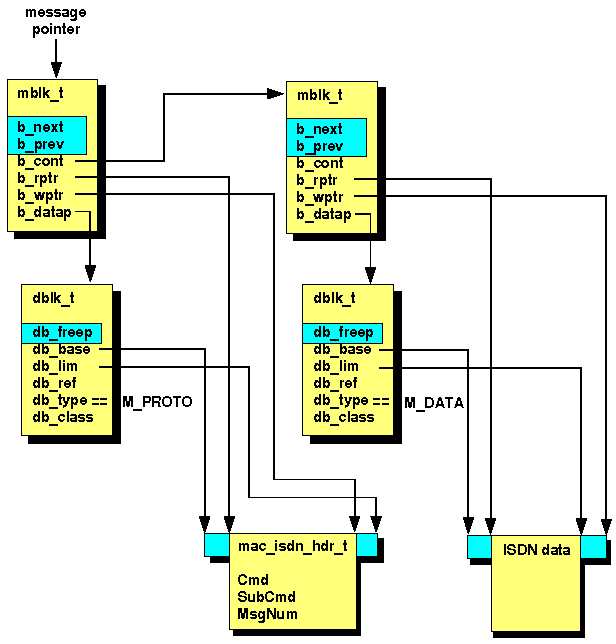
|
|
``Messages'' (sometimes called ``commands'') convey
information between applications and ISDN drivers.
An ISDN message is sent in an
M_PROTO(D7str)
type STREAMS message as
a primitive described in
Section D7isdn manual pages.
The control portion contains a
isdn_msg_hdr(D4isdn)
header; message parameters are coded in the control portion
following the isdn_msg_hdr.

SCO ISDN command message
ISDN messages are always followed by corresponding answering messages. So, the application sends a request (_REQ) to an ISDN driver, and the driver answers with a confirmation (_CONF). Similarly, the ISDN driver sends an indication (_IND) message to an application, and the application answers with a response (_RESP) indication.
Messages contain information about these services:
There are three logical types of messages, shown in the following tables:
Signaling protocol primitives
Logical connection primitives
Administrative primitives
| Service | Primitives |
|---|---|
| FACILITY | ISDN_FACILITY.ISDN_CONF(D7isdn) ISDN_FACILITY.ISDN_IND(D7isdn) ISDN_FACILITY.ISDN_REQ(D7isdn) ISDN_FACILITY.ISDN_RESP(D7isdn) |
| LISTEN | ISDN_LISTEN.ISDN_CONF(D7isdn) ISDN_LISTEN.ISDN_REQ(D7isdn) |
| MANUFACTURER | ISDN_MANUFACTURER(D7isdn) |
| SELECT_B_PROTOCOL | ISDN_SELECT_B_PROTOCOL.ISDN_CONF(D7isdn) ISDN_SELECT_B_PROTOCOL.ISDN_REQ(D7isdn) |